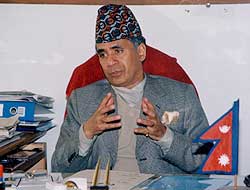President of the Federation of Nepalese Chambers of Commerce and Industry (FNCCI) Ravi Bhakta Shrestha, 48, was appointed Assistant Minister for Culture, Tourism and Civil Aviation by King Gyanendra during the expansion of the Chand administration last month. He spoke to Nepali Times about his new job. Excerpts:
 Nepali Times: So, how does it feel like to be on the other side?
Nepali Times: So, how does it feel like to be on the other side?
Ravi Bhakta Shrestha: I was the president of the FNCCI when His Majesty entrusted his confidence in me and assigned me this new responsibility. This is not exactly a role reversal, but I believe my background from the private sector will help me in discharging my duties in this ministry. In my past three weeks in office I have been studying the problems affecting the tourism sector, which is the economic backbone of the country. I have held consultations with those in the tourism sector. We have identified major problems and are discussing strategies to address them which will be short, medium and long-term in nature. We have already started implementing short-term measures.
What exactly are these measures?
Tourism in Nepal has not done well in the last few years. At the request of entrepreneurs, including the Hotel Association of Nepal (HAN), we have recommended ministries like Finance, Labour and Water Resources re-schedule loans and taxes, give hotels the status of an industry and entitle them to similar benefits. The ministry has also directed Royal Nepal Airlines to improve its day-to-day performance, curb anomalies and come up with what they call a debt inventory. We are also thinking of developing Kathmandu as an international travel hub.
None of this is really new, is it?
Due to its geo-strategic location, Kathmandu can serve as a hub for international flights from Tibet, parts of China, northern states of India and other countries in the region. In order to attract transit tourists, our ministry has already recommended three-day duty free visas to transit passengers. After getting suggestions from concerned ministries, we will take this proposal to the cabinet. They will come into force only after the cabinet decision. We are also considering requests to add international flights to Nepal and bring back reputed companies like Singapore and Lufthansa.
There has been some back-and-forth on the issue of privatising Royal Nepal Airlines. What is the final word on that?
RNAC has a very important role to play in the development of tourism in Nepal. But the present status quo can't continue. So, to rescue the national flag carrier and make it effective, we are going to implement ecommendations made by the Shankar Sharma committee. Out of the two options-to privatise or turn it into a public limited company-privatising the RNAC will take much longer. We are considering the second option. The final decision will be taken by the Council of Ministers.
You can do all this, but tourism is affected by political instability. How are your short-term measures going to help?
Besides water resources, tourism offers great potential for the development of our country. With holy places like Lumbini and Pashupatinath, we can promote religious tourism. Similarly, Nepal can also be promoted as a destination for sports tourism by selling sports like cricket, golf and elephant polo. Unlike in India, we have yet to develop the concept of domestic tourism. We already have infrastructure to attract tourists from all over the world. What we need now are effective strategies and aggressive marketing.
We have seen sporadic incidences of violence in remote parts of the country magnified by the media, giving Nepal a bad image. We need to promote Nepal as a safe and attractive destination on the basis that not a single tourist has been harmed in the last seven years of the insurgency.
As a member of the cabinet, what is your response to critics who say you have not been able to hit the ground running?
It is our job to prove that we are different (than the previous governments). The government is working hard to fulfil the five-point mandate entrusted to it by His Majesty. All of us know that peace and stability is vital for the development of economy as well as tourism in the country. This government needs support from all sections of society, including the political parties, civil society and entrepreneurs to meet those objectives. The government has given top priority to restoring law and order in the country which won't be possible without support. We must not forget our country is passing through a very fluid and critical time. If the situation is not arrested in time, things could get worse. We urge everyone to cooperate.


